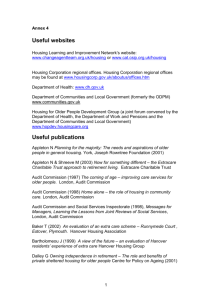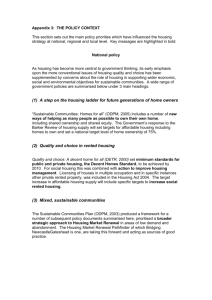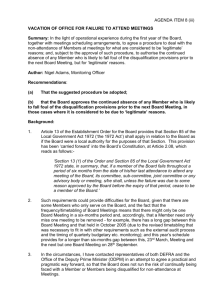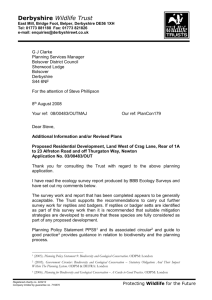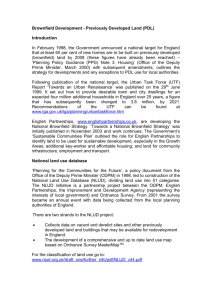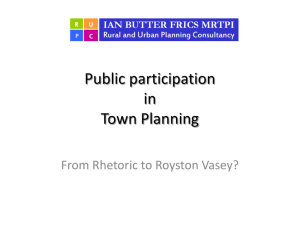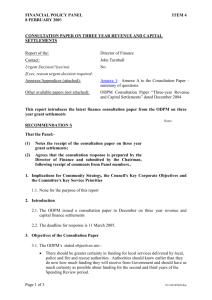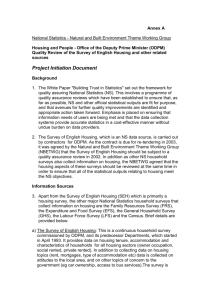Selling to ODPM Office of the Deputy Prime Minister Introduction
advertisement
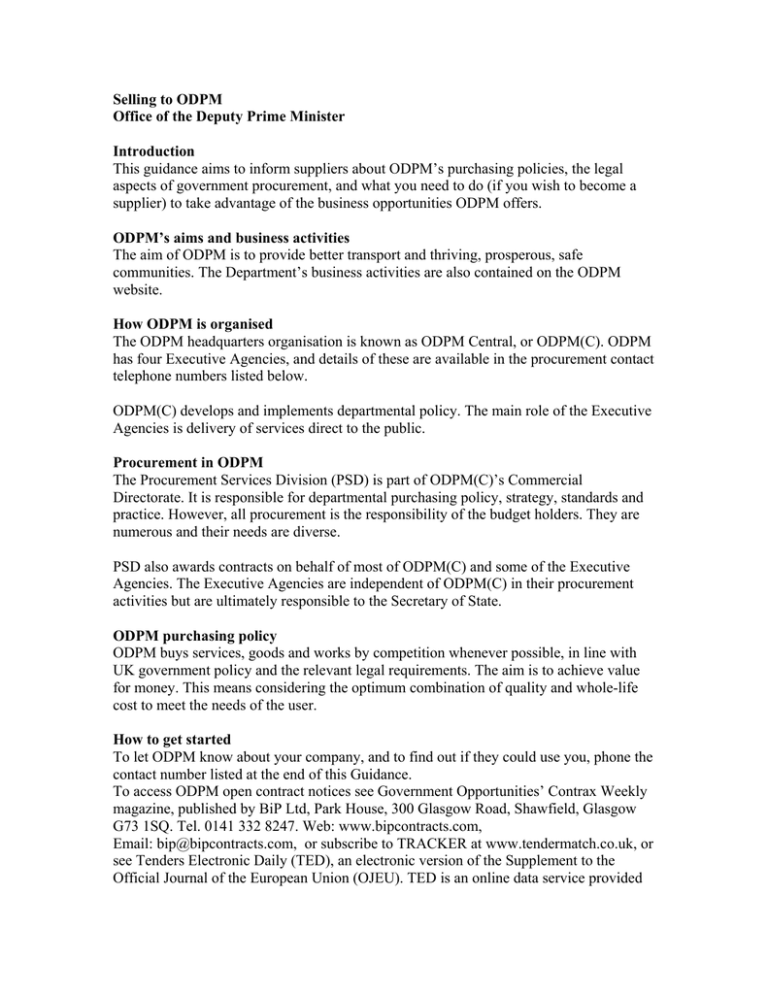
Selling to ODPM Office of the Deputy Prime Minister Introduction This guidance aims to inform suppliers about ODPM’s purchasing policies, the legal aspects of government procurement, and what you need to do (if you wish to become a supplier) to take advantage of the business opportunities ODPM offers. ODPM’s aims and business activities The aim of ODPM is to provide better transport and thriving, prosperous, safe communities. The Department’s business activities are also contained on the ODPM website. How ODPM is organised The ODPM headquarters organisation is known as ODPM Central, or ODPM(C). ODPM has four Executive Agencies, and details of these are available in the procurement contact telephone numbers listed below. ODPM(C) develops and implements departmental policy. The main role of the Executive Agencies is delivery of services direct to the public. Procurement in ODPM The Procurement Services Division (PSD) is part of ODPM(C)’s Commercial Directorate. It is responsible for departmental purchasing policy, strategy, standards and practice. However, all procurement is the responsibility of the budget holders. They are numerous and their needs are diverse. PSD also awards contracts on behalf of most of ODPM(C) and some of the Executive Agencies. The Executive Agencies are independent of ODPM(C) in their procurement activities but are ultimately responsible to the Secretary of State. ODPM purchasing policy ODPM buys services, goods and works by competition whenever possible, in line with UK government policy and the relevant legal requirements. The aim is to achieve value for money. This means considering the optimum combination of quality and whole-life cost to meet the needs of the user. How to get started To let ODPM know about your company, and to find out if they could use you, phone the contact number listed at the end of this Guidance. To access ODPM open contract notices see Government Opportunities’ Contrax Weekly magazine, published by BiP Ltd, Park House, 300 Glasgow Road, Shawfield, Glasgow G73 1SQ. Tel. 0141 332 8247. Web: www.bipcontracts.com, Email: bip@bipcontracts.com, or subscribe to TRACKER at www.tendermatch.co.uk, or see Tenders Electronic Daily (TED), an electronic version of the Supplement to the Official Journal of the European Union (OJEU). TED is an online data service provided by the EU that lists higher-value contracts for public sector organisations across the European Union. Some ODPM procurement units keep records of potential suppliers and will decide which suppliers should be invited to submit either a simple quotation or a more formal tender. To help ODPM consider you as a potential supplier, you may be asked to: •send details of the services you offer or goods you supply; •provide details of your financial, commercial and technical background; •tell ODPM what relevant experience you have; •tell ODPM about the qualifications of your staff; •tell ODPM about your quality management system; •provide references from bankers and previous customers; •arrange for ODPM to visit your premises. Construction Contracts When ODPM needs construction services it uses Constructionline, a database of companies that have been assessed financially and technically and deemed capable of carrying out work up to specified financial limits in the public sector. For more information about Constructionline, please contact: Constructionline PO Box 6441 Basingstoke Hampshire RG21 7FN Tel: 0870 240 0152 Fax: 01256 383899 Email: constructionline@capitagroup.co.uk Web: www.constructionline.co.uk Quotations and tenders For small-scale projects ODPM invites written quotations from a number of suppliers. For larger projects, where the estimated contract value exceeds a set threshold, it invites formal tenders. If a contract will exceed limits set by the EC, ODPM must follow the EU Procurement Directives (see below). Whenever ODPM invites a company to tender, it: •specifies its needs in terms of outputs, whenever appropriate, to encourage innovation; •invites tenders from sufficient suppliers to ensure there is genuine competition, whilst still giving tenderers a reasonable chance of winning; •makes sure tendering procedures and documentation are as clear and concise as possible, and only asks for information necessary to evaluate bids; •establishes the evaluation criteria on which the decision to award the contract will be based; •provides all tenderers with equivalent information and opportunity. Submitting quotations and tenders ODPM uses its own terms and conditions so do not refer to any standard terms and conditions that your company uses when you submit a simple quotation or respond to a formal invitation to tender. In the case of a simple quotation, ODPM’s terms and conditions are printed on the reverse of its standard order forms. When you are invited to submit a formal tender you will receive a set of ODPM’s terms and conditions, a specification, a tender form and a price schedule. You will be asked to sign, date and return the tender form and price schedule. If you do not comply, your tender may be invalidated, even if you send a covering letter. Do not write on or change in any way the documents you return, except when asked to do so. You may send a covering letter and supplementary material of your own, but do not qualify any of the terms and conditions, or the specification. If you do, you may be asked to withdraw the qualifications or risk having your offer rejected. You should also supply any additional information that is requested. When you submit a tender make sure all instructions are followed carefully, or it may be rejected. For example, tenders received after the stated deadline will be rejected, even if the delay occurred in transit. Evaluation of tenders All competing tenders are assessed against the same criteria, which will have been established before the tenders are opened. Your bid will be successful if it is the one that offers the Department the best value for money – see ODPM purchasing policy, above. Bids are evaluated by assessing how suppliers fulfil the key criteria in the specification, and other criteria such as price, delivery date and quality. Frequently, the ODPM unit or the evaluation panel will interview tenderers who have submitted the best proposals. A contract is awarded as soon as possible after the evaluation process has been completed. Post-tender negotiations may be entered into where there is opportunity to enhance value for money, and where it is appropriate to do so. Debriefing If you would like to know why an offer of yours was rejected, you are entitled to ask the ODPM unit which issued the tender, and they will give you a full explanation. Public procurement regulations All government departments and many other public sector organisations must follow the World Trade Organisation (WTO) Government Procurement Agreement (GPA) and a series of EU Procurement Directives. These are implemented in the UK by the public procurement regulations, which regulate how ODPM buys works, goods and services. These rules promote non-discriminatory, equal and transparent competition between suppliers of goods, services or works. The Official Journal of the European Union If the value of a contract is estimated to be over the current EU Procurement Directives threshold, and it is not exempt from the regulations, ODPM is required to publish a contract notice in the Supplement to the Official Journal of the European Union. The contract notices allow you to express an interest in any of the proposals advertised. On 1 January 2002 the thresholds were set at £100,410 for supplies and certain services, (£123,740 for research) and just over £3,861,932 for works. These thresholds are revised every two years. Up-to-date threshold figures can be found on the HM Treasury website at: www.hm-treasury.gov.uk There are three procedures set by the regulations for inviting firms to tender: •negotiated procedure; •open procedure; •restricted procedure. ODPM generally uses the restricted procedure, under which it limits invitations to tender to a set number of firms, the number being stated in the contract notice. If you reply within the time limit specified and enclose all the information requested, ODPM will consider whether to invite you to tender. You will not be invited to tender if you do not send all the information requested within the time limit specified by an OJEU contract notice, even if you had previously expressed an interest. The OJEU Supplement is issued daily from Luxembourg and is available on the internet, as Tenders Electronic Daily. CD-Rom versions are available from BiP, (contact details as above) and OJEU advertisements are included in Government Opportunities’ Contrax Weekly publication (details as above). The Export Intelligence Service (EIS), part of the British Overseas Trade Board, offers a subscription service to UK-based exporters, providing firms with copies of relevant information on opportunities overseas. To subscribe, please contact: Trade Partners UK Kingsgate House 66-74 Victoria Street London SW1E 6SW Tel: 020 7215 5444/5 Web: www.tradepartners.gov.uk EU Directives also allow ODPM to publish a Prior Information Notice (PIN) once a year in the OJEU. This gives the estimated value of goods and services in various categories that ODPM expects to buy in the coming year. PINs are not invitations for you to apply for inclusion on tender lists. This happens when the contract notices are issued. Suppliers employing the severely disabled. The Government introduced Special Contracts Arrangements (SCAs) in 1994. These help eligible non-profit-making suppliers and workshops with severely disabled people making up more than 50% of the workforce, within the European Union and European Economic Area, to compete for government business. ODPM buyers receive a catalogue of products and services available from SCA suppliers and are encouraged, in line with government policy, to include them on relevant tender lists. If you wish to register your organisation for the scheme, or find out more about it, contact www.jobcentreplus.gov.uk/cms.asp?Page=/Home Opportunities for Small and Medium Enterprises (SMEs) It is government policy to encourage SMEs – although ODPM is a large department, it has many contracts suitable for smaller organisations. ODPM gives SMEs the opportunity to compete for its business where this will give value for money and is fair to other firms. Business Link is a support network that provides information and advice to SMEs. If you wish to be directed to your nearest Business Link, please contact 0845 600 9 006, or see www.businesslink.org Environmental policy ODPM constantly aims to improve its environmental performance by: •encouraging manufacturers, suppliers and contractors, through tighter specifications, to develop environmentally preferable goods and services at competitive prices; •making sure that any products derived from wildlife, such as timber, plants and leather goods, are from sustainable sources. Products must also comply with EU and international trading rules such as CITES (the Convention on International Trade in Endangered Species); •working with contractors to improve environmental performance where this is relevant to the contract and will give value for money; •meeting all statutory regulations and official codes of practice and specifying that contractors do the same when working on ODPM premises. Environmental impact of procurement Procurement can have a very significant environmental impact. ODPM’s commitment to minimise this impact is reflected in its policies and the guidance followed by its suppliers and buyers. ODPM makes sure its buyers follow best practice by carrying out pilot projects or environmental audits of each operational area or function. ODPM takes account of whole-life costs and not just the initial price when assessing value for money. It specifies recycled products where practicable and when they give value for money, taking account of whole-life costs. Labelling schemes ODPM uses various labelling schemes to encourage suppliers to take environmental considerations into account. These include: •the European Commission’s mandatory energy labelling scheme. Preference is given to the most energy-efficient products where they give value for money, taking account of whole-life costs; •environmental labels issued through recognised schemes to help identify environmentally preferable products (those with a low environmental impact over their life cycle); •using criteria already established under official eco-labelling schemes (where available and relevant to the contract) to improve specifications for products and services. ODPM also uses the Government’s Green Claims Code (see below) to inform buyers and challenge suppliers whose claims appear to contravene the Code. Voluntary schemes Procurement Directives distinguish between products or services specific to a contract and general processes and practices, which are not relevant to the procurement process. For example, ODPM would not make it a general requirement when awarding a contract that suppliers comply with EMAS or ISO 14021, which are voluntary schemes for encouraging businesses to reduce their environmental impacts. However, these schemes are useful indicators of environmental performance and may be taken into account if relevant to the contract. More information on policies and practice on green procurement is available on Defra’s website at www.defra.gov.uk/environment/index.htm Green claims code This code, which applies to all ODPM suppliers, covers any green claim made about a product or service at the point of sale. It states that a green claim should: •be clear, accurate and capable of being supported by scientific evidence; •be relevant to the product or service and used only in an appropriate context; •be clear about what aspect of the product or packaging the claim refers to; •be significant in terms of the overall impact of the product on the environment during its life cycle; •be open about any significant doubt or division of scientific opinion over the issue on which the claim is being based; •explain the meaning of any symbol used in the claim; •be written in plain language; •be legal, decent, honest and truthful. This publication can be ordered by quoting Product Code 00 EP 0437. Please contact: Defra Publications Orderline Admail 6000 London SW1A 2XX Tel: 0845 955 6000 Fax: 020 8957 5012 Email: defra@Iforcegroup.com Web: www.defra.gov.uk/environment/gcc/index.htm Quality assurance ODPM wants to place contracts with firms whose quality control and product reliability are of a high standard, so that it can keep its own quality inspections to a minimum. In its pre-tender assessment ODPM looks for evidence of a good quality-control system, such as BS EN ISO 9000. Although formal certification to such a standard is not usually mandatory, it will help if you can show that effective systems for quality control are used. To ensure safety and reliability, some specifications may require products to meet specific international, European or British technical standards. You may be asked to produce relevant certificates. Information on quality is available from the Department of Trade and Industry at www.dti.gov.uk Your local Training & Enterprise Council (TEC) may also be able to help. Find out more on www.dfee.gov.uk/info/matecs1.htm (0208 547 3934) or contact your Business Link on www.businesslink.org Electronic trading ODPM is currently in the process of implementing an electronic ordering system, to enable it to realise the benefits of trading electronically with suppliers. This system will be an online browser-based application that provides the ODPM buyer with access to electronic catalogues for the purchase of low-value goods and services. The system will also include functionality for the electronic transmission of orders, order acknowledgements, delivery notes and invoices, together with online order status tracking and electronic payment. ODPM’s business units are using the Government Procurement Card, a Visa-based corporate purchasing card, mainly for purchases under £1000. The Department’s long-term aim is to do business with all suppliers electronically, automating and integrating the whole purchase-to-pay cycle to maximise efficiency. Considerable savings are available to ODPM and its suppliers, such as reduced processing costs and fewer errors owing to re-keyed data. ODPM will, however, maintain alternative trading routes with those suppliers who are not in a position to trade electronically but are nevertheless still able to offer best value for money. Prompt payment of invoices ODPM recognises the importance of cash flow to all companies, especially small firms. It has adopted the CBI Prompt Payers Code, and has a clear policy to pay bills in accordance with the terms of the contract. Where no contract terms are specified, ODPM policy is to pay within 30 calendar days of receipt of a correct invoice. If an invoice is disputed and you and the ordering officer cannot resolve it, a senior official within the relevant purchasing unit will arbitrate at your request. You can help make sure invoices are paid promptly by checking that all invoice details are accurate, including the purchase order number, and that the invoice is correctly addressed. Let ODPM know about changes of name, address or bank details as soon as possible. To help pay quickly, ODPM pays suppliers through the Bankers Automated Clearing Service (BACS). ODPM contracts now include a clause stating that if you employ sub-contractors you are expected to pay them promptly, too. Propriety Public servants follow a strict code of procurement ethics. They and members of their families cannot accept gifts or offers of hospitality from individuals or organisations with whom ODPM has, or could possibly have at some time in the future, a contractual relationship. Procurement contact telephone numbers: ODPM(C): Policy Advice 020 7944 3058 Office Equipment 020 7944 8288 Estates Accommodation and Office Services 020 7944 8429 IT Goods and Services 020 7944 5066 Research into Urban and Rural Policy, Housing and Construction 020 7944 3403 Office Stationery 020 7944 8451 Printing Services 020 7944 4665 Publicity Services 020 7944 4676 The Executive Agencies: The Fire Service College 01608 650 831 Planning Inspectorate 0117 987 8516 QEII Conference Centre 020 7222 5000 The Rent Service 020 7554 2460
